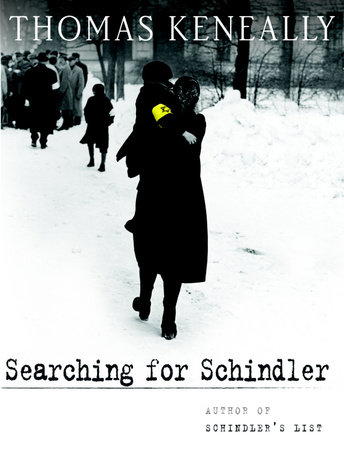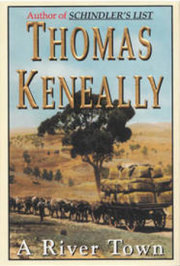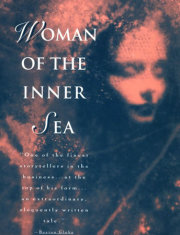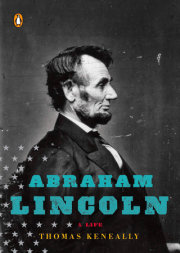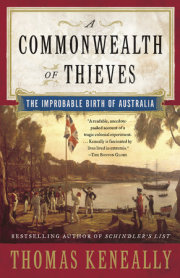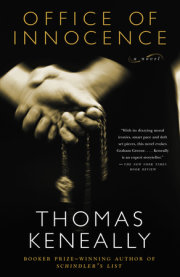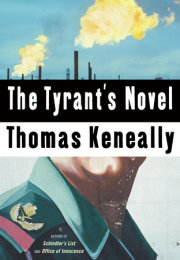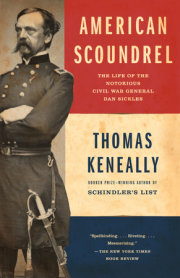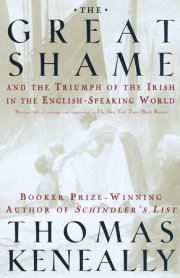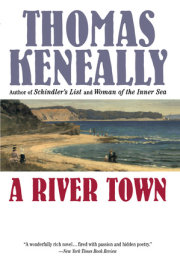OneThe Santa Ana winds blow down into the Los Angeles Basin from the north and northeast. They are torrents of air, starved for water in the deserts of Nevada and California. Racing to the sea over the Sierras, picking up heat, dust and spores as they fall, they flow through passes and canyons down into the basin of that great desert city, bringing with them a sense of displacement and filling the air with a strange, malign electricity.
It was late October of 1980, and for me the wind had a curiosity value, a little like an anecdotally useful experience of a slight earth tremor. The heat and bearing of the wind swept me along Wilshire Boulevard as I went out to shop, looking for a modestly priced briefcase in Beverly Hills, unsure that I was in a zone where such banal things were sold. Passing exorbitant Rodeo Drive on my left, one block from the hotel, I saw, stretching away south, a street that seemed to have normal shops, and family cars bearing the scuffs of suburban use. Malls had not yet subsumed the business of such centers as this, and people seemed to be busily parking and seeking out plain, useful human wares.
I had plenty of time to shop. My plane was not leaving for Sydney until the following night. In those days Australia was not a glamor destination, and only a few brave American space travelers joined us natives on the bi- or triweekly planes to the far southwest of the Pacific and my vast native continent, which many Americans still confused with Austria, and whose chief claim to international renown was the lambasting Germaine Greer gave its patriarchy in
The Female Eunuch.
I had not gone far along the normal-looking street, South Beverly Drive, when opposite a Hamburger Haven I encountered a store named the Handbag Studio. Its goods looked out at me through the glass, out past banners which declared the Handbag Studio’s Fall Sale. On these placards, kid skin, cowhide, pigskin, snakeskin and crocodile were mentioned, but above all, discount percentages.
I hesitated, always a nervous shopper. But the shopkeeper soon appeared beside me, having stepped out from within. He had a stocky Slavic look and resembled the great character actor Theodore Bickel--a touch of Tartar in the cheeks, a barrel chest, powerful arms, a wrestler’s neck. He wore a white shirt, a conservative tie and a good jacket with an Eagle Scout pin nested in its lapel. There was a glitter of fraternal amusement in his eyes. Even then, I believe I perceived that he had dealt in markets beyond my knowing.
He said, “So it’s a hundred and five degrees out here and you don’t want to come into my air-conditioned store. Do you think I’ll eat you?”
“I was just looking for a briefcase,” I said defensively.
“I have the best, young man. Hong Kong and Italy. The best!”
With these assurances, I let myself be led into the store, which--as he had promised--was cool.
“I have a good case,” I told him earnestly.
My wife and daughters had given it to me. But one of its hinges had gone, and the other hinge was tearing too. The storekeeper respected my sentimental attachment to the old one, but pointed out that such harm was unlikely to befall what he was offering me. “You just can’t put everything in them. A truck? They’re not a truck, you know!” And his wide-set Tartar eyes glimmered.
He introduced me to his salesman, a man named Sol. They both had the same sort of Eastern European whimsy, but you could see at once Sol’s was of the melancholy rather than the exuberant strain.
As we chatted, the proprietor said, “I must compliment you, sir, on your beautiful British accent.”
“Not British,” I told him, with an automatic Fenian twitch imbued in me by Irish grandparents. “Australian.”
It was true and even fascinating that the Americans, largely ignorant of the bad odor in which our accent was held by the British, unconditionally liked our nearly vowelless English.
“So then,” he asked me, “how did a gentleman like you bust your hinge?”
I explained that I’d been at a film festival in Sorrento in Italy.
The Sorrento gig arose from the revival of the Australian film industry in the early-to-mid 1970s, with directors such as Peter Weir, Bruce Beresford, Gillian Armstrong and Fred Schepisi. Since 1972 I had been associated, as friend and dabbler in film, with Schepisi, then a young Melbourne director, and had even “acted” in Schepisi’s first film,
The Devil’s Playground, a far-above-average tale of Catholic childhood and, of course, emergent sexuality colliding with absolutist Catholic doctrine. By that northern autumn, Fred Schepisi had also made a novel of mine,
The Chant of Jimmie Blacksmith, into a film. The book and film concerned an Aboriginal who in 1900 proceeded on an anti-white rampage in an Australia within whose Constitution, then in its final draft, all reference to the rights of Aboriginals was omitted. I’d played a small part in that film as well, and since Fred Schepisi himself could not go to Sorrento for its biennial film festival, which was devoted that year to Australian cinema, I was invited to go as his stand-in.
They accommodated us in resort hotels along the Mediterranean coast, a festival load of people who had already established themselves and would go on to great renown--Bruce Beresford, the director; Barry Humphries, alias Dame Edna Everage; Judy Davis; Sam Neill; Bryan Brown; Ray Lawrence. We were still, both as a film industry and as a nation, unaccustomed to serious attention in northern European cultural centers, and enjoyed being the plat du jour.
The Italian press treated each film with a heady seriousness, and the showings left time for dining on sumptuous Neapolitan cuisine. But the Italians also gave us a massive amount of bumf on their industry. This load of serious documents was certainly not the sort of thing one would instantly throw away, unless one has grown worldly and weary of conferences. Indeed, I think the pages still exist in a storage box somewhere, a brown archive box unlikely to be opened by me in this life, and irrelevant to the next. The desire to fit in all the Italian material had busted the briefcase, one of its two hinges at the back coming away.
I told all this to the proprietor, who introduced himself as Leopold Page. I had not long been calling him Mr. Page when he told me he somewhat regretted the name. It had been foisted on him at Ellis Island in 1947, where he said they had scared him by telling him Americans couldn’t pronounce his Polish name, but that if he wanted to change it later, it would cost him $500. He quickly invited me to call him Leopold; and then somehow, in a short time, I took to using the diminutive, Poldek. His true family name from Krakow, that beautiful Galician city, was Pfefferberg--pepper mountain. I would come to think it a name that suited his exorbitant energy, his feisty goodwill.
Having been insistent to get me into his shop, Poldek seemed more curious about me than interested in a sale. This was scarcely an act. It would prove to be the way he was. “Do you know some friends of mine?” Poldek asked me. He mentioned various Eastern European names from Sydney and Melbourne. No, I hadn’t had the honor of meeting these people, I said. “They’re Jewish friends of mine,” he explained. “From Krakow and other places.” I explained that the Jewish community in Sydney, though substantial, was not as numerous as in Melbourne.
As we talked, Poldek showed me a simple, lock-up, shining black briefcase, with nicely patterned calfskin. It was spacious and had many compartments. I said I’d take it. I was grateful that the shopping had been uncomplicated and unexpectedly pleasant, and in between chatting, the deal-making had probably taken no more than two or three minutes.
I gave Poldek my credit card, and he put Sol on the phone to call the numbers through to the credit company.
As minutes passed without the card being accepted, Sol kept making doleful faces at us. Poldek told him, “Well, keep trying, Sol!”
“I’m trying, I’m trying. They won’t talk.”
“Give me the phone!”
“You want the phone when no one’s on the line?”
“What do you mean ‘no one’?”
“I mean they went away to check the card. I mean there’s nobody on the line,” said Sol, rejecting all assistance. So Poldek turned to me again and, showing he knew the map of the world, asked me how come I was in California on my way back from Italy to Australia.
I had a book out in the United States, I told him. Viking Press. The publishers had asked me, while I was at least in the Northern Hemisphere, to come over from Italy to the States to do a short book tour. Poldek asked me the name of the book.
Confederates, I told him, and he said, “
My God! Sol, is that not the same book I just read a review in
Newsweek?”
“How should I know what you read?” asked dyspeptic Sol.
I might have doubted Poldek’s claim to have seen reviews, except that there
had been a review in
Newsweek. With the false modesty of the astonished author, I confirmed that it was so. “And now, sir, what is your name again?”
I told him.
“Sol, Sol,” he called to his hapless assistant, parked on the phone. “This guy’s a good guy. Cut ten dollars off that!”
Sol grimaced beneath his mustache, and made a
Don’t blame me! sort of gesture with the hand not holding the phone.
Poldek confided to me merrily, “Poor Sol. He’s had a rough life.”
I was by now such a cherished fellow in the eyes of Mr. Leopold Page that he called his son Freddy to come over from the wholesale warehouse and meet me. Turning up a few minutes later, Freddy proved to be a muscular American boy, impeccably dressed for business. He was highly courteous, however, and softly spoken, and at one stage, as Sol continued his labors with MasterCard, muttered a few items of business to his father.
“Oh, what does he think?” rumbled Poldek to his son, obviously referring to some client. “If he thinks he can get them for that crazy price, tell him to try Borsa Bella himself. To think I started the son-of-bitch off with a special discount! Now he wants my right arm thrown in.”
“Okay, Pop,” murmured Freddy. “Pop, it’s okay. I’ll talk to him.” It was clear that Freddy had a less pyrotechnic temperament than his father.
Leopold Page turned back to me. “But what am I thinking? You haven’t met my beautiful wife, Misia.”
The way he uttered the word
beautiful was full of luscious and emphatic diphthongs.
Bee-ourt-ee-ful, with the accent on the
ourt.
At the phone, Sol gave another doleful shrug. “They say they’ve got to call Australia. There’s been all this Australian credit card fraud, they say.”
“Give me the phone, give me the phone,” insisted Poldek in his jowly basso. “You shouldn’t say that sort of thing in front of a gentleman.”
Sol handed the receiver to him with a gesture that said,
Go ahead, big shot! “Hello,” said Poldek Page/Pfefferberg. “What is your name? Barbara. Barbara, darling, you sound like a beautiful woman. I know you have your job. But this man in my store is a gentleman all the way from Australia! Do you want to kill my business, Barbara? I know you don’t. But do I need to put up a sign saying,
Australians, Keep Away!? Yes, I know you’re doing your best, but my customer has an appointment to go to. Can you help him along? He’s a writer and his schedule’s tight. Don’t do this to him, Barbara, darling. Make it quick is what I beg. I’ll put you back to Sol now, darling. This is Sol.”
He handed the phone back to a mournfully gratified Sol. He then moved to me with his hands spread placatingly. “It is a crazy world, Mr. Thomas.” He pronounced my name Tow-mass.
“So,” he said reflectively. “A writer. What a wonderful thing! I was a teacher before the war. A professor in the
gymnasium! But a writer! Do you know Mr. Irving Stone? Irving Stone came to this store once. We have a good reputation around Beverly Hills.”
As Freddy the son stood by, awaiting any aphorism I chose to utter, Poldek took me aside, toward the curtain which led into the store’s back room. At the curtain, he still talked.
“Here’s what I wanted to pointed out . . .” he said in a usage he had made his own. “I know a wonderful story. It is not a story for Jews but for everyone. A story of humanity man to man. I tell all the writers I get through here. Sitcom guys. Reporters for the Los Angeles
Times. I get famous producers or their wives. Did you know Howard Koch? Howard Koch wrote
Casablanca. A really nice guy. You see, everyone needs a handbag, everyone needs an attache case. So I tell everyone I know the greatest story of humanity man to man. Some listen--an article there, a news item here. A beautiful young man I know, executive producer of
Simon and Simon at Paramount . . . he does what he can. But it’s a story for you, Thomas. It’s a story for you, I swear.”
Every writer hears that exhortation. People without any idea of how long a book takes to write pass on the tale of an amusing uncle or aunt, along with the strange addendum: I could write it if I had nothing else to do. The suggestion is sometimes made tentatively, sometimes with the sincere expectation that the writer will answer,
Wow! That he will drop to his knees and embrace this jewel of a story. That it will take him a few weeks’ leisure to produce the finished manuscript. Issues such as Who will have creative control? Who will get the chief credit on the title page? What will be the royalty share? Are the children of the eccentric aunt likely to sue? What share of subsidiary rights will the author get?--all these issues and more have not occurred to the generous soul who says, “It’s a story for you, I swear.”
But I had never heard the words come from the lips of a soul so vivid, so picaresquely Eastern European, so endowed with baritone and basso subtleties of voice and inflection, so engorged with life, as Leopold Page/Pfefferberg.
He waited for me to put up resistance, but I did not yet.
He said, “I was saved, and my wife was saved, by a Nazi. I was a Jew imprisoned with Jews. So a Nazi saves me and, more important, saves Misia, my young wife. So although he’s a Nazi, to me he’s Jesus Christ. Not that he was a saint. He was all-drinking, all-black-marketeering, all-screwing, okay? But he got Misia out of Auschwitz, so to me he is God.”
Freddy was listening to this with a minor nod. It was the family story, as central as a book of the Pentateuch.
“Come back into the repair shop, I’ll show you.”
Poldek led me through the curtained door. Freddy followed. We came into a spacious room with an open office at the rear. The light in the room behind the store area was factory-dim. A slim, well-dressed woman in advanced middle age was working at a repair table running lengthwise along the room, covered with expensive handbags with broken clasps or hinges, and with pliers and receipt books.
“Misia, darling!” Poldek boomed.
The woman looked up with a faint, even timid frown, like a wife used to having her husband’s extravagant enthusiasms imposed on her. Poldek introduced me to her. A beautiful guy, he said I was. I was a writer and he’d been telling me about Schindler. This was the first time I heard that name.
Copyright © 2008 by Thomas Keneally. All rights reserved. No part of this excerpt may be reproduced or reprinted without permission in writing from the publisher.

